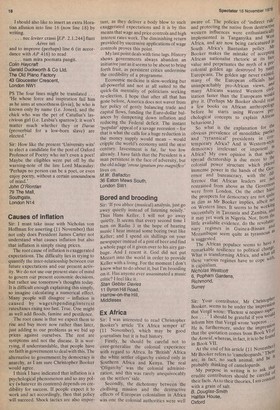Ex Africa
Sir: I was interested to read Christopher Booker's article 'Ex Africa semper id' (11 November), which may be good journalism but it is bad history.
Firstly, he should be careful not to over-generalize the colonial experience with regard to Africa. In 'British' Africa the white settler oligarchy existed only in Southern Africa and Kenya. The real 'Oligarchy' was the colonial administration, and this was rarely unequivocably on the settlers' side.
Secondly, the dichotomy between the civilising mission and the destructive effects of European colonialism in Africa was one the colonial authorities were well aware of. The policies of 'indirect rule and protecting the native from destructive western influences were enthusiasticallY implemented in Tanganyika and We,st Africa, and are now being caricatured 10 South Africa's Ban tustan policy. Mr Booker makes the mistake of accepting African nationalist rhetoric at its face, value and perpetuates the myth of a re" colonial golden age destroyed by oast/ Europeans. The golden age never existed, many of the European officials had unimpeachably pro-African views, and many Africans wanted Western CWd ization faster than the Europeans wow', give it. (Perhaps Mr Booker should oat' a few books on African anthropolog before he starts using Western Psr chological concepts to explain African behaviour.) So what is the explanation for the obvious prevalence of monolithic parties and 'tyrannical' presidents in con' temporary Africa? And is Western-sty democracy irrelevant or impotent. 111 Africa? My own opinion is that viicie. spread dictatorship is due more to II colonial power structure which Place immense power in the hands of the ernor and bureaucracy, with the dui ference that African leaders are n° restrained from above as the Governl were from London. On the other ha°. the prospects for democracy are not (rote, as dim as Mr Booker implies, albeit on Western lines. It seems to be worki successfully in Tanzania and Zambia, all it may yet work in Nigeria. Nor, from tb little available evidence, do the revolutod nary regimes in Guinea-Bissau a° s Mozambique seem quite as tyrannous 3 is suggested. The African populace seems to have a remarkable resilience to political cbangeji What is transforming Africa, and wilat.,ah these various regimes have to cope is capitalism.
Nicholas Westcott 6, Popham Gardens, Richmond, Surrey Sir: Your contributor, Mr Christopbeor Booker, seems to be under the impress_i° that Vergil wrote: 'Flectere si nequeo sulxrd bos . . . 'I should be grateful if you Wow , inform him that Vergil wrote `superos He is, furthermore, under the impressio f that the quotation comes from Book VI c/ti the Aeneid, whereas, in fact, it is to be f°1111 in Book VII. At the end of his article (11 November) Mr Booker refers to 'cameleopards.' Thereis are, in fact, no such animal, and he probably thinking of camelopards. hat My purpose in writing is to ask t f erudite contributors should be careful °t their facts. As to their theories, I am conten with a grain of salt.
B. Douglas-Smith Halifax House, Oxford


































 Previous page
Previous page